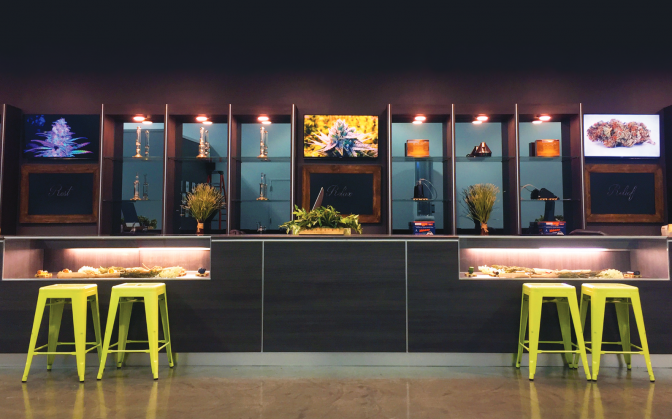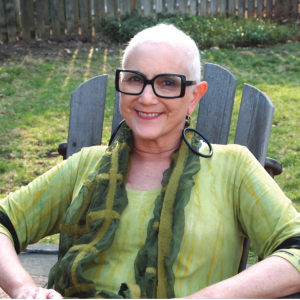How Cancer Gave Me a License to Toke

The list of approved conditions for medicinal marijuana in New Jersey, where I live, reads like a casting call for the damned: ALS, MS, terminal cancer, muscular dystrophy, Crohn’s disease and any terminal illness in which the patient has less than 12 months to live. And then, under special conditions: epilepsy, intractable skeletal muscular spasticity, HIV, AIDS and (non-terminal) cancer.
I never bothered to go through the paperwork for medical marijuana (MMJ) for Crohn’s disease, which I’ve had for 32 years. Crohn’s has been part of my life for so long I barely notice it—except during those rare occasions when I go, writhing in pain, to the ER. But cancer—now that was a different story. That’s the Big C, a grisly monster looming and ready to pick my whole life up and dash it to smithereens.
Luckily, my acupuncturist is licensed to write MMJ prescriptions. He confirmed my diagnosis, entered my information into his computer and gave me some paperwork and instructions. I went home, followed the instructions, paid the $200 registration fee by credit card and— voila!—received my medical marijuana card in the mail the following week.
I’ve exerted much more effort getting a driver’s license renewed in New Jersey. It was also, I should add, the easiest of the chores I had to do in the weeks before chemo, including canceling a vacation and shopping for a wig. However, procuring the marijuana was a teeny bit harder.
Within a few minutes, I was called back to a no-frills room where I met my cannabis concierge, a serious man of about 40. I had a ton of questions, and he answered them all dispassionately. The choice was pretty basic: the house sativa or the house indica. I took some of each and handed him $300 in crisp bills.
But a few months later, when I was looking to make another appointment, I couldn’t reach Greenleaf at all, either by phone or email. I tried over a period of weeks. When I called my doctor, hoping he had a private line or a secret incantation, he said all his patients were complaining. I was later told by Greenleaf COO Julio Valentin that their phones and computers were hacked during that period. (They’re now back up and running.) But I had moved on to a new supplier: the Garden State Dispensary in Woodbridge, 22 miles from my home.
Garden State answered the phone on my first try and scheduled me for a visit six days later. I was disappointed with the wait, but they said a first visit needed more time to set up. And the rules are apparently different than those at Greenleaf; Garden State accepts debit cards, and I can bring a caretaker or friend to my consultation, which is not allowed at Greenleaf.
Garden State is located on Route 1, one of New Jersey’s oldest roadways. Sitting next to a car dealership on a shopping strip with plenty of parking, it looks like a repurposed Toys “R” Us. Inside, there’s a comfortable padded bench in front of an untinted window where customers can wait and view a blackboard that lists all the strains available. On any given day, you might find Bubba Berry, Sour Diesel, Sour Willie, Death Star, Flo and a CBD strain like Otto. Color-coding on the blackboard tells you whether the strain is available in bud, shake or rolled form, and you can peruse notebooks filled with descriptions of each strain while you wait.
If you want a consultation, you’re taken into a tiny but pleasant room, where a counselor asks about your condition—nausea, pain, sleeplessness, sleepiness—and whether pot makes you paranoid (if so, no sativa for you), and tells you which strains will help you the most. You’re also asked about your profession, and when I said I was a writer, my counselor, who looked like she’d be equally at home in a surf shop, smiled and recommended more “creative” varieties.
At checkout, they always explain the same thing about a service charge to my debit card, and some amount of it that’s credited back or handed back as cash, and I always nod and pay no attention. They have vapes, pipes, pipe cleaners, rolling papers and odor-proof bags for carrying your pot, but I’ve only bought the room deodorizer. I’m always amused when they give me a nice little paper gift bag to take my goodies away in. These days I prefer to vape; it’s better on your lungs.
So, getting medical marijuana in New Jersey has, for me, been relatively frictionless. The experience is still limited by the fact that dispensaries are not allowed to sell oils or edibles. Doctors have to recertify their prescriptions through the system every three months, which can mean nudging your doctor with a friendly reminder—and, of course, this means additional work for them. The products aren’t cheap (shake costs $342 an ounce at Garden State, and flowers go for the outrageous price of $535), and certainly are not covered by health insurance. A recent state report about the program estimated that the average price for regulated medical pot in New Jersey is $489 per ounce, significantly more expensive than the black-market alternative.
And there aren’t enough dispensaries: Even if a sixth dispensary opens soon, access is still geographically inconvenient for patients in the far corners of the state. The $200 fee for a patient to register—reduced to $20 if you’re enrolled in Medicaid or a similar low-income assistance program—is exorbitant compared to fees in other states (there’s no fee in Maine, for example, and in Colorado it’s just $15). Caregivers are charged the same $200 fee—a double burden for those who are too debilitated to pick up pot on their own. Plus, it can be hard to find a doctor registered with the program, particularly pediatricians.
Still, it’s worked for me. It got me through chemo nausea, and still helps with the lingering peripheral neuropathy that chemo left me with. Best of all, I can smoke pot in my own backyard and not have to worry about getting busted. And then there’s this: Being 60, white and female, having a medical marijuana license is a source of much amusement among my friends. Some people pick up my ID and shake their heads, smiling. Others have accompanied me on field trips to experience the wonder of legal pot in Chris Christie’s New Jersey.
What can I say? Cancer has its perks.
If you enjoyed this Freedom Leaf article, consider subscribing today!

